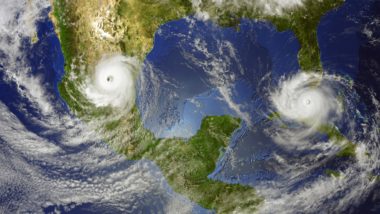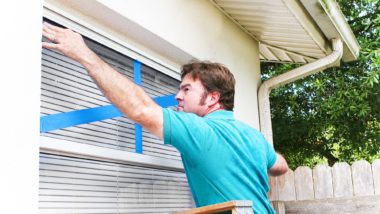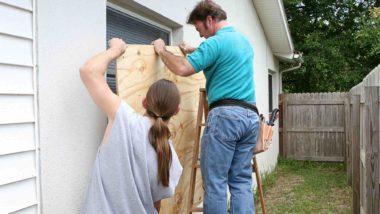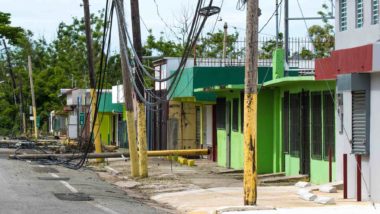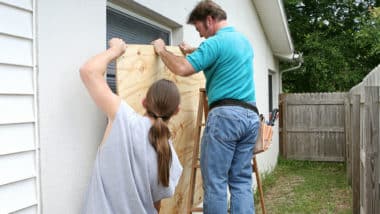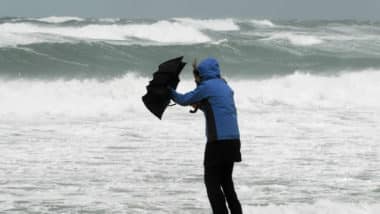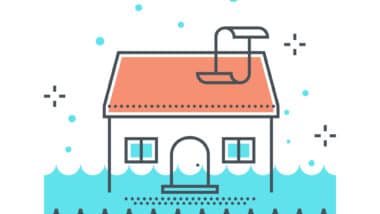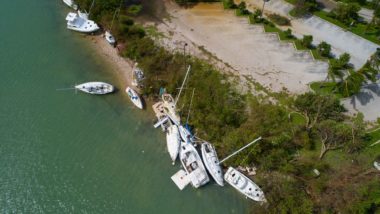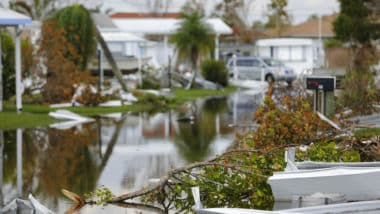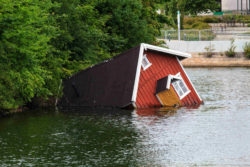 Policyholders in Florida who suffered losses as a result of Hurricane Michael continue to wait for hurricane insurance claim payments.
Policyholders in Florida who suffered losses as a result of Hurricane Michael continue to wait for hurricane insurance claim payments.
More than a year after the hurricane made landfall on the coast of Florida’s panhandle, victims reportedly continue to live in tents or trailers or are doubling up with friends and relatives, creating a serious housing crisis. Experts are predicting that a full recovery could take many more years.
Meanwhile, a year after the storm, insurance companies continue to draw out a lengthy claims process.
The Catastrophe
Michael made landfall on Oct. 10, 2018, hitting the Sunshine State’s panhandle with winds in excess of 160 miles per hour. At Category 5, the hurricane was one of the most powerful storms to hit the continental U.S. in recorded history, devastating the communities of Mexico Beach and Panama City as well as causing substantial damage to Tyndall Air Force Base. Fifty lives were lost and economic damages have been estimated at over $25 billion, including $6 billion worth of military hardware, $2.8 billion in agricultural losses (including 3 million acres of timber).
Hurricane claim costs in Florida have been estimated at over $5.5 billion.
Of all the panhandle communities that suffered as a result of Michael, Mexico Beach was hit the hardest. A number of houses were either demolished or swept away by 14-foot waves, with entire neighborhoods being flattened to their foundations. Other communities that sustained heavy damage were:
- Apalachicola
- Mariana
- Panama City
- Port St. Joe
- St. George Island
Damage from Hurricane Michael extended into Georgia, where insurance claims were estimated at $70 million, North Carolina and as far north as Virginia and Maryland.
The Aftermath
The day prior to Hurricane Michael’s landfall, the Administration authorized the Federal Emergency Management Agency (FEMA) to coordinate efforts to deal with the disaster. The day after, five Florida counties were declared official disaster areas:
- Bay
- Franklin
- Gulf
- Taylor
- Wakulla
Residents of these counties were eligible for grants and business loans to cover uninsured losses, repairs, and temporary shelter. Originally, the federal government was to cover 75 percent of relief costs. However, since that time, Governor Ron DeSantis has requested that amount to be increased to 90 percent. According to the Tallahassee Democrat, a $19 billion disaster relief package was finally passed in the House of Representatives in June of 2019.
Hurricane Michael Survivors Today
As of Oct. 10, 2019, a year after landfall by Michael, approximately 5,000 people are without permanent homes. Rent for remaining living quarters has become unaffordable for most, forcing many to leave their communities. This has had an impact on public schools. Twelve percent of the students in Bay County have moved away, impacting state education funding. Meanwhile, tax revenues have started to dry up at a time when small businesses are struggling to stay open.
At the same time, rents on the few properties that are livable have skyrocketed, and mortgage companies continue to foreclose on residents who lost their jobs because of the storm and have been unable to keep up with payments.
There have been less tangible effects as well. It has become difficult to obtain health care services – including those for mental health at a time when depression, stress, and domestic violence have been on the rise.
In response to this situation as residents continue to wait for hurricane claim settlements, Bay County officials have come up with a number of solutions, including the construction of “tine houses,” use of shipping containers and 3-D printers to construct new dwellings. On the mental and physical health front, they are offering physicians and other health care providers signing bonuses and student loan forgiveness.
Rebuilding efforts are being hampered by what amounts to a “Catch 22” situation. As Panama City manager Mark McQueen pointed out in an interview with the Journal of Emergency Medical Services, “It’s a chicken and an egg thing…you can’t get employees [construction workers] until you get housing. You can’t get housing without construction workers.”
All of these problems are being exacerbated by delays in the administration of insurance claims, adding more stress for those who continue to wait for their hurricane claim settlement checks.
Why?
According to a former state representative, insurance companies are the “Number 1 obstacle” to recovery efforts.
Allan Bense, who served as Speaker of the House in the Florida state legislature, represented Panama City between 1998 and 2006. He is a lifelong resident of the community and still resides there with his former constituents. At a recent news conference, he stated: “I’m on my seventh adjuster for my home – seventh!”
Bense is co-chairman for Rebuild850, an organization that works to keep hurricane recovery efforts on track and moving forward.
Despite a Florida state law that requires insurance companies to pay claims within 90 days, claims have been delayed for several months. In some cases, simply getting an estimate can take several months.
Now, more than a year after Hurricane Michael ripped through Panhandle communities, fewer than 20 percent of hurricane claims have been settled. Bense states on Rebuild850’s website, “Insurance companies, just frankly, try to beat you down.”
It is a state of affairs that Florida’s chief financial officer, Jimmy Patronis – also a native of the Panhandle – called “unacceptable” and “inexcusable” in a statement he issued over hurricane recovery claim delays in August 2019.
Insurance Companies Respond
Ironically, the same insurers who have been taking entirely too long to resolve their insureds’ claim in their time of greatest need have a champion in a most unlikely individual: Florida’s state Insurance Commissioner, David Altmaier. the official charged with regulating the state’s insurance companies.
According to the editorial board of the Tampa Bay Times, Altmaier appeared before the state Senate Banking and Insurance Committee last month, telling them that he was unaware of any situations in which claims had not been paid in a timely manner. Referring to Florida’s law requiring insurers to pay claims within 90 days, he said that he had not seen “even an instance of a violation of that statute,” adding that the Florida Division of Consumer Services had received an “extraordinarily low” number of complaints in the wake of Hurricane Michael.
Altmaier acknowledged there are over 18,000 insurance claims waiting to be settled – and nobody seems to know the reason for the delay. According to Altmaier, just over 3,600 are still open due to litigation.
Why You are Still Waiting on Your Hurricane Claim
While Florida’s insurance law requires insurers to settle claims within 90 days, there is a loophole for insurance companies, according to the Tampa Bay Times. The 90-day deadline only applies once the company has determined how much the claim is worth and the insured agrees to that amount. There is virtually no limit on the amount of time an insurer can take to provide an estimate, leading to the delay Floridians are experiencing with their insurance claims from the 2018 hurricane season.
In a number of cases, there have also been questions as to whether damage to a structure was due to flood or to wind. The reason is that one may be covered under an insured’s policy and the other may not. While a standard homeowner’s policy covers most types of damage (including fire, weather, falling objects, and deliberate vandalism), flood insurance is separate from other types of damage.
Often, it is unclear which force of nature was responsible. For example, if water comes in under the door, that is considered a flood – and would not be covered unless the property owner had specifically taken out a flood policy. On the other hand, if the wind blew the roof off or punched through the walls, which then allowed water to enter the building, that would be considered wind damage – and would be eligible for compensation.
Expediting Your Hurricane Claim
Bense, as much a victim of hurricane damage as his neighbors, also notes that people in his community and those nearby are not the sort to litigate. He says, “Folks in the Panhandle don’t like to sue…we just try to work it out, But so many people have just said, ‘I give up’.”
On the other hand, many victims may not realize that they may indeed have grounds for legal action. Monica Vegas-Pitan, an attorney for Florida Legal Services, told WFSU News that in cases of divorce, eviction or abuse, people do understand the need for litigation. However, she adds, “For disaster legal needs, people will not necessarily self-identify as having a legal problem.”
Her advice is not to give up.
According to WFSU News, officials in Tallahassee are applying some pressure on insurance companies to settle their Hurricane Michael claims soon so victims can recover and get back to their everyday lives. But such wheels turn slowly, and the residents of the affected communities are running out of patience.
Join a Free Hurricane Insurance Claim Investigation
It is important that you make sure you are properly compensated by your insurance company for the damage caused by Hurricane Dorian. Get help today from experienced insurance claim attorneys. Fill out the form on this page for more information.
ATTORNEY ADVERTISING
Top Class Actions is a Proud Member of the American Bar Association
LEGAL INFORMATION IS NOT LEGAL ADVICE
Top Class Actions Legal Statement
©2008 – 2026 Top Class Actions® LLC
Various Trademarks held by their respective owners
This website is not intended for viewing or usage by European Union citizens.
Get Help – It’s Free
Join a Free Hurricane Insurance Claim Investigation
If you qualify, an attorney will contact you to discuss the details of your potential case at no charge to you.
PLEASE NOTE: If you want to participate in this investigation, it is imperative that you reply to the law firm if they call or email you. Failing to do so may result in you not getting signed up as a client or getting you dropped as a client.
E-mail any problems with this form to:
[email protected].
Oops! We could not locate your form.

